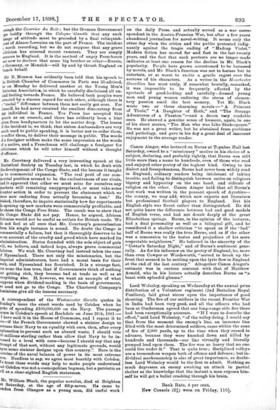Mr. Courtney delivered a very interesting speech at the Statistical
Society on Tuesday last, in which he dealt with the development of the Congo State, and the lessons it taught
to commercial expansion. " The real peril of our com- mercial position seemed to be the exclusiveness of our rivals, and it appeared that either we must seize for ourselves any markets still remaining unappropriated, or must take some counter action in order to prevent the abatement which we were now enduring from actually becoming a loss." He wished, therefore, to inquire statistically how far experiments in opening up new markets were commercially profitable, and be chose the Congo Free State. The result was to show that he Congo State did not pay. Hence, he argued, African ionise would not be useful as outlets for British trade. We do not feel at all sure that Mr. Courtney's generalisation from his single instance is sound. No doubt the Congo is commercially a failure, but then it thoroughly deserves to be so on account of the cruelty and greed which have marked its administration. States founded with the sole object of gain will, we believe, and indeed hope, always prove commercial failures. We wish Mr. Courtney had instead taken the case of Nyassaland. There not only the missionaries, but the Imperial administrators, have had a moral basis for their work, and Nyassaland has flourished. It is a strange fact, but none the less true, that if Governments think of nothing cut getting rich, they become bad at trade as well as at everything else. If, however, we want an example of what mppens when dividend-making is the basis of government, we need not go to the Congo. The Chartered Company's lominions give all the lessons necessary.










































 Previous page
Previous page